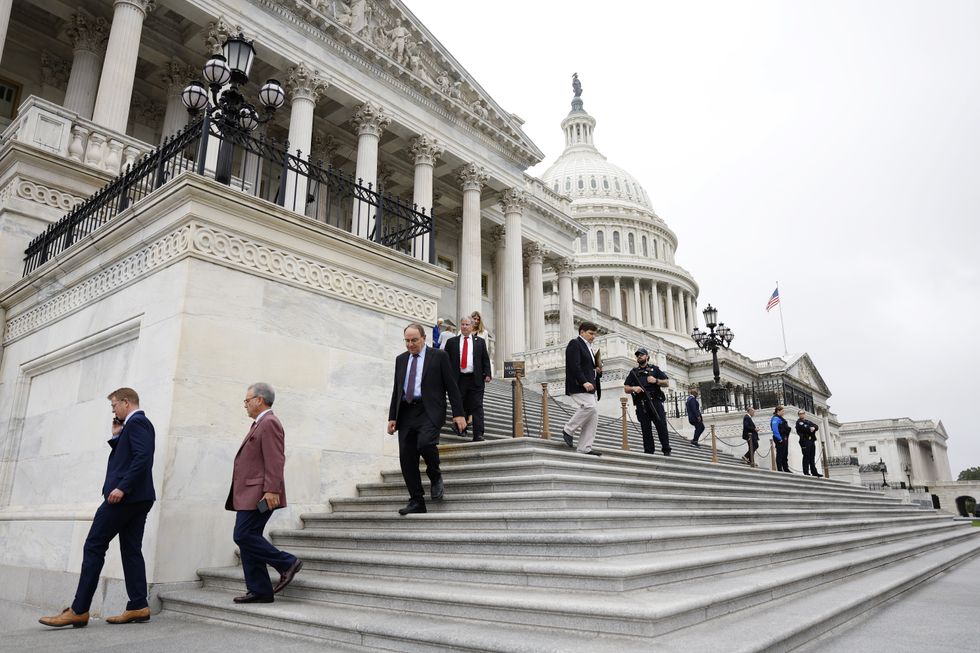Key pickup opportunities for Republicans to secure their House majority
Republicans will likely maintain their slim majority in the House, but several key races have not yet been called. Republicans are just four seats away from the majority, currently holding 214 seats, while Democrats hold just 203 seats. In order for one party to win the majority, the party must hold at least 218 of the 435 House seats. Although Democrats are leading 10 of the 18 uncalled races, Republicans are well on their way to maintaining their House majority. California is the most likely path to victory for the GOP, with Republicans leading in four of the 10 uncalled congressional races. Republican incumbents John Duarte of California's 13th Congressional District, David Valadao of California's 22nd Congressional District, Ken Calvert of California's 41st Congressional District, and Michelle Steel of California's 45th Congressional District are all leading their Democratic challengers. These four competitive California races would be enough to keep Republicans in the majority. The GOP has another pickup opportunity in the neighboring state of Arizona. Republican incumbent Juan Ciscomani of Arizona's 6th Congressional District is currently leading Democratic challenger Kirsten Engel. Ciscomani's is the only congressional race that has not yet been called in Arizona.Up north, Republicans are guaranteed another seat in the race for Washington's 4th Congressional District. Unlike most other states, Washington has a ranked-choice system, which allows voters to rank their candidates in preferential order rather than having a two-party primary like most other races. As a result, constituents are voting between two Republican candidates, incumbent Dan Newhouse and challenger Jerrod Sessler. Newhouse is currently ahead of Sessler, but no matter which way the race pans out, Republicans will have secured the seat. Similar to Washington, Alaska also adopted the ranked-choice voting system, though notably, Alaska introduced a ballot measure to end ranked-choice voting, which is currently on track to pass in the state. Of the three Alaskan candidates, Republican challenger Nick Begich is leading Democratic incumbent Mary Peltola and independent candidate John Wayne Howe in the race for Alaska's sole congressional seat. While the race has not yet been called, Begich is leading Peltola by four points, making the longtime red state a likely layup for the GOP. Republicans are leading a much tighter race out east in Iowa's 1st Congressional District. Republican incumbent Mariannette Miller-Meeks is currently ahead of Democratic challenger Christina Bohannan by just 0.2% with 99% of the votes counted. Miller-Meeks holds just a 1,200-vote advantage.Although Democrats are leading 10 of the 18 uncalled races, Republicans are well on their way to maintaining their House majority. Like Blaze News? Bypass the censors, sign up for our newsletters, and get stories like this direct to your inbox. Sign up here!


Republicans will likely maintain their slim majority in the House, but several key races have not yet been called.
Republicans are just four seats away from the majority, currently holding 214 seats, while Democrats hold just 203 seats. In order for one party to win the majority, the party must hold at least 218 of the 435 House seats.
Although Democrats are leading 10 of the 18 uncalled races, Republicans are well on their way to maintaining their House majority.
California is the most likely path to victory for the GOP, with Republicans leading in four of the 10 uncalled congressional races. Republican incumbents John Duarte of California's 13th Congressional District, David Valadao of California's 22nd Congressional District, Ken Calvert of California's 41st Congressional District, and Michelle Steel of California's 45th Congressional District are all leading their Democratic challengers.
These four competitive California races would be enough to keep Republicans in the majority.
The GOP has another pickup opportunity in the neighboring state of Arizona. Republican incumbent Juan Ciscomani of Arizona's 6th Congressional District is currently leading Democratic challenger Kirsten Engel. Ciscomani's is the only congressional race that has not yet been called in Arizona.
Up north, Republicans are guaranteed another seat in the race for Washington's 4th Congressional District. Unlike most other states, Washington has a ranked-choice system, which allows voters to rank their candidates in preferential order rather than having a two-party primary like most other races. As a result, constituents are voting between two Republican candidates, incumbent Dan Newhouse and challenger Jerrod Sessler.
Newhouse is currently ahead of Sessler, but no matter which way the race pans out, Republicans will have secured the seat.
Similar to Washington, Alaska also adopted the ranked-choice voting system, though notably, Alaska introduced a ballot measure to end ranked-choice voting, which is currently on track to pass in the state.
Of the three Alaskan candidates, Republican challenger Nick Begich is leading Democratic incumbent Mary Peltola and independent candidate John Wayne Howe in the race for Alaska's sole congressional seat.
While the race has not yet been called, Begich is leading Peltola by four points, making the longtime red state a likely layup for the GOP.
Republicans are leading a much tighter race out east in Iowa's 1st Congressional District. Republican incumbent Mariannette Miller-Meeks is currently ahead of Democratic challenger Christina Bohannan by just 0.2% with 99% of the votes counted. Miller-Meeks holds just a 1,200-vote advantage.
Although Democrats are leading 10 of the 18 uncalled races, Republicans are well on their way to maintaining their House majority.
Like Blaze News? Bypass the censors, sign up for our newsletters, and get stories like this direct to your inbox. Sign up here!
Originally Published at Daily Wire, World Net Daily, or The Blaze
What's Your Reaction?

































































































